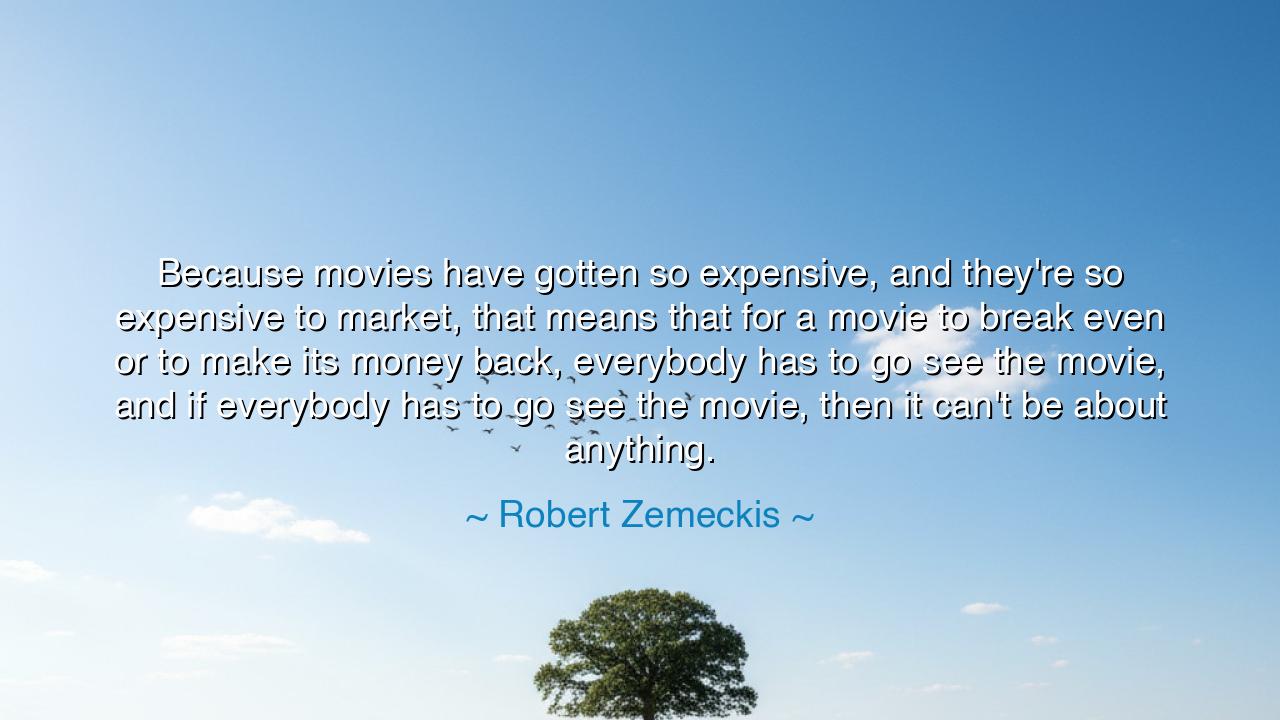
Because movies have gotten so expensive, and they're so
Because movies have gotten so expensive, and they're so expensive to market, that means that for a movie to break even or to make its money back, everybody has to go see the movie, and if everybody has to go see the movie, then it can't be about anything.






Listen closely, O seekers of truth, to the words of Robert Zemeckis, who speaks with the voice of one who has seen both the beauty and the perils of the modern movie industry: “Because movies have gotten so expensive, and they’re so expensive to market, that means that for a movie to break even or to make its money back, everybody has to go see the movie, and if everybody has to go see the movie, then it can’t be about anything.” In these words lies a profound insight into the modern struggle of art and commerce. Zemeckis reveals the price of success in a world where money and marketing have overshadowed the original purpose of storytelling—the desire to create something meaningful that speaks to the human soul.
In the ancient world, when the bards sang of heroes, gods, and battles, they did so not for the approval of kings or the markets, but because they sought to tell the truth of their people’s lives. These stories were not about pleasing everyone, but about capturing the essence of the human condition. The Greeks, in their tragedies, and the Romans, in their epic poems, spoke to the deep struggles and moral dilemmas of their time, knowing that not every story would find favor with all. In Zemeckis’ words, we see a lament for the loss of that artistic freedom, where the desire to reach everyone often strips away the depth and substance that once made stories worth telling.
Consider the ancient playwrights who, like Sophocles or Euripides, wrote not for mass appeal but for the hearts of their audiences. They created works that delved into the complexities of life—works that challenged their viewers to reflect on fate, morality, and humanity’s place in the world. These works were not made to please the many but to engage the few who were willing to confront the hard truths. Zemeckis’ critique of the modern movie industry speaks to the danger of reducing art to a product, to a commodity that must be mass-marketed to succeed. The pressure to appeal to all crowds leaves no room for the complexity of the story itself.
In Zemeckis’ reflection, we see a parallel to the story of the Renaissance. During that time, artists like Leonardo da Vinci and Michelangelo were free to create works of depth and meaning, not bound by the limitations of mass approval. Michelangelo’s Sistine Chapel was not painted for the masses—it was a work born of personal vision and faith, a masterpiece that could not be reduced to a product for the masses. Zemeckis, like the great Renaissance artists, understands that true creativity and art cannot be dictated by the need to please everyone. The creation of a masterpiece requires the courage to follow one’s own vision, even when it does not fit neatly into the mold of what is considered commercially successful.
The lesson here, O seekers, is clear: true art cannot be reduced to the lowest common denominator, nor should it be created merely to satisfy the largest audience. When movies or any form of art are crafted with the sole purpose of reaching everyone, they inevitably lose their soul. Zemeckis’ critique of the industry challenges us to think beyond the cost of production, the marketing strategies, and the pressures to sell tickets. The essence of a story is lost when it is created solely for profit, when the depth of the narrative is sacrificed to make it palatable for the masses. Just as ancient works of art did not conform to popular demands, we must learn to create with integrity and purpose, even in the face of the pressures of commercialism.
Look, O wise ones, at the lessons of those who have created not for the many, but for the few—those who dared to create for the sake of truth and authenticity. Think of James Cameron’s Titanic, a movie that, while mass-appealing, still explored the depth of human relationships amidst disaster, not simply a tale of wealth and beauty. Reflect on Stanley Kubrick, who crafted films like 2001: A Space Odyssey, a masterpiece that defied conventional expectations, demanding the audience engage with the profound mysteries of existence. These filmmakers, like the ancients, understood that true art is not for everyone, but for those who seek meaning beyond the surface.
Therefore, O future generations, take heed of Zemeckis’ words and create not for the masses, but for the truth. Let your works reflect the depth of your vision, and do not be swayed by the forces of commercialism that seek to dilute the soul of art. In your pursuit of creation, whether it be in film, literature, or any other medium, seek to make something that resonates with the eternal, something that transcends the fleeting demands of the market. For it is in the pursuit of true artistic expression—not mass appeal—that you will create something that endures beyond the limitations of time, and that will truly touch the hearts of those who seek deeper meaning in the world.






AAdministratorAdministrator
Welcome, honored guests. Please leave a comment, we will respond soon